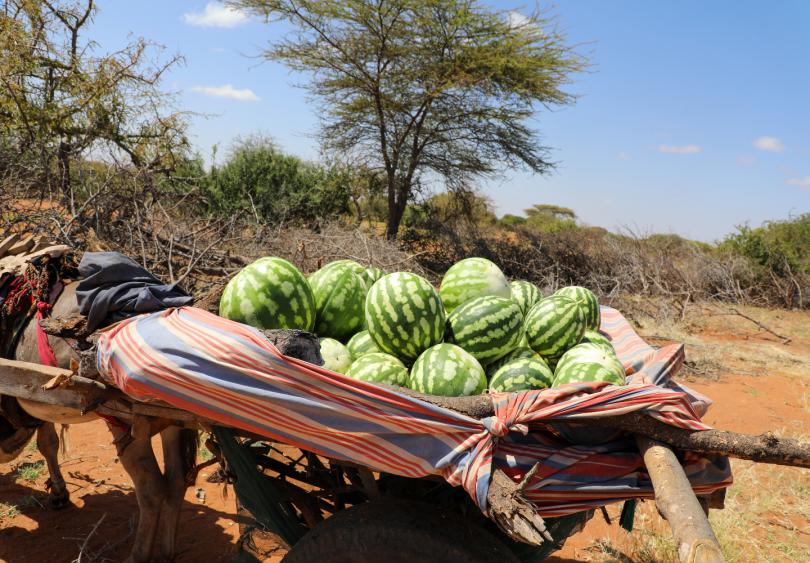FROM PASTORALISM TO FARMING: SALAT ADAN'S RESILIENCE AMIDST CLIMATE CHANGE CHALLENGES

Salat holding a watermelon he has harvested from his farm. Photo Courtesy| Dorothy Waweru, Save the Children
By Dorothy Waweru
Salat Adan, a father of eight children knew pastoralism as a way of livelihood for almost all his life. With 280 goats and 10 camels, he was almost guaranteed that his future and that of his family would be bright. However, with five consecutive failed rainy seasons in Wajir County, his hope began to dwindle after the loss of all his livestock save 10 goats. Devastated and in shock, Salat had reached a dead end.
Luckily, through a seven months cash transfer program by Save the Children targeting 3,182 families, Salat’s life took a positive turn after being registered into the program. For the seven months, Salat received ksh. 13,500. Money he says came at the right time when he had no other source of income. From part of that money, Salat decided to try farming.
“With the money I had saved, I cleared the grass and thorns from my farm, fenced it then planted watermelon for the first time. I had never imagined that one day I would hold a jembe or a panga to till the land but with the ravaging drought and less food at home, I had to do something fast,”says a jovial Salat.
Salat says that his watermelon crop had begun to bear fruit and he was optimistic that he would get good money from what appeared to be a bumper harvest. The report from the meteorological department about the forthcoming elnino rains was music to Salat’s years. He waited in anticipation for the rains which he says he thought would come to quench the thirst of his watermelon crop and further lead to the bumper harvest he was anticipating.
Woe unto Salat, when the rains came they reversed all of his gains. His watermelon crops were destroyed and he counted losses of up to Ksh. 300,000.
“I was very discouraged after the rains destroyed my watermelons. They were my source of hope and I dreaded the thought of going back to the difficult life of pastoralism,” admits Salat
After the rains, subsided, Salat decided to try planting the watermelons again, this time with the sheer hope that they would survive and generate income for his family. To his utter shock, the melons survived and on the day we visited his farm, he was loading two donkey carts with the fruits ready to sell them to the nearby towns and the bulk of them in Wajir town. Salat shared some pieces of very sweet watermelon with us which soothed us from the scorching sun.

Donkey cart loaded with water melon fruits harvested from Salat's farm. Photo Courtesy|Dorothy Waweru,Save the Children
“I have made close to Ksh.150,000 from the sale of melons. This money, I am using it to pay school fees for my children who are in primary school and high school. I would advise other pastoralists to join me in this farming business because it is less tiresome as compared to walking with livestock for long distances in search of water and pasture. Personally, I want to be a farmer all my life and never to go back to pastoralism,” says Salat.
Salat reveals that his passion for farming has increased and he would like to receive more training on the same. Further, he requests support to set up a borehole to solve the water problem, which is a major challenge for him.
“If I get a solar powered borehole close by, I will do more farming because I have seen the fruits of farming. I also hope that I can get a greenhouse so that I plant diverse crops such as tomatoes, pawpaw and even bananas,” says Salat.
Wajir is among the 23 arid and semi-arid lands (ASAL) owing to the relatively low amounts of rainfall received. The area is susceptible to increased droughts and floods and with the threat of climate change, the ASAL areas like Wajir risk to become deserts.
“Its fulfilling to see Salat’s resilience amidst climate change effects. Its important that people like Salat are empowered for sustainable livelihoods,”Mohamednoor Ali, Food Security & Livelihood Officer Save the Children.
Save the Children has been providing humanitarian assistance through the Bureau of Humanitarian Assistance (BHA) funded by USAID. Among the interventions provided include cash transfers, nutrition, water sanitation and hygiene and child protection services. This article was first published on Daily Nation on 9th March 2024.




